Catherine Edsell is an adventurer, conservationist and global expedition leader passionate about forging a more symbiotic relationship between humans and other animals, for the benefit of both.

Catherine Edsell is an adventurer, conservationist and global expedition leader passionate about forging a more symbiotic relationship between humans and other animals, for the benefit of both.
Adventure beginnings
No one would call me an ‘adrenaline junkie’, nor do I have a ‘bucket list’ that I need to tick off before I die. My 23 years of working ‘on expedition’ have been driven by an ulterior motive - to effect change.
In 1997 I set off to the wild Caribbean coast of Costa Rica, my first real adventure. My role was to train willing groups of international volunteers in leatherback sea turtle conservation techniques. I taught them how to collect eggs in the dead of night from the rear end of a lumbering female, whilst poachers lurked in the shadows waiting to intercept the ancient laying ritual themselves. I taught them how to replicate the turtle’s nest with their bare hands and safely deposit the eggs in a guarded hatchery where two months of sanctuary would see them develop into hatchlings, saving them from being served up as aphrodisiacal bar snacks in local towns. I taught them how to record data that would give insight into the global population and conservation status of the species.
Catherine Edsell, courtesy of Catherine Edsell
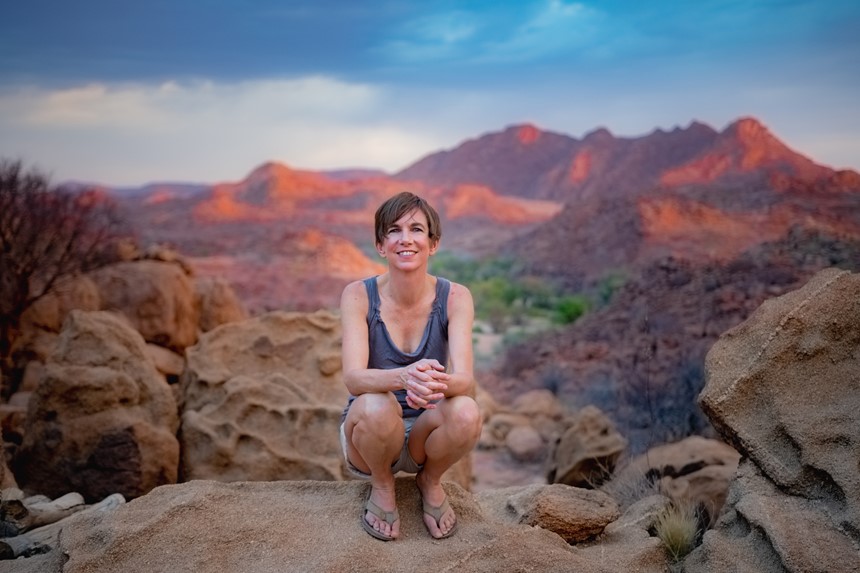
Citizen science
These were the early days of ‘citizen science’, a now familiar practice whereby untrained members of the public are rapidly schooled in basic biodiversity science techniques which ultimately aid both the scientific community and global conservation efforts simultaneously. I didn’t realise it at the time, but I was at the forefront of a movement that would change the parameters of both adventure and conservation.
Over the past 23 years I have worked in fourteen different countries on expeditions that have collected data on everything from macaw behaviour in Peru to coral reef health in Oman, the Maldives and Madagascar. I’ve tracked jaguars in Belize, desert elephants in Namibia and witnessed sperm whale migration in the Azores, all in the name of research. In Indonesia I was the Forest Operations Manager for a large biodiversity science expedition company that investigated a myriad of species, all using citizen scientists to support ongoing scientific research. This approach to adventure has not only enabled me to work with incredibly passionate scientists and conservationists from around the globe, but to experience both the positive and negative power of human-animal relationships.
Animals have no voice of their own. If they did, they would rightly testify that humans have relentlessly pushed many of their fellow species to the brink of extinction for ultimately selfish gains. Habitat loss is the number one reason animals are struggling to survive. Hunting, poaching, overfishing, introduced pathogens, climate change and subsequent ocean acidification are all contributing to their demise. I’d be lying if I didn’t admit that at times, it all felt too much. I was overwhelmed by the enormity of the problems and felt that my tiny actions were too little, too late (and this was back in the ‘90s!). But to experience is to embody, and to have had the privilege of diving healthy reefs, of living for months, years, in undisturbed virgin rainforest, my hammock supported by two ancient guardians, creates a sense of belonging- a sense of connection that in turn creates allegiance: I am not separate from the earth on which I stand. I am far from superior, and have much to glean from the natural world, so in support of the fact that animals have no voice, adventure and activism, to me, go hand in hand. As David Attenborough has said: “No one will protect what they don’t care about; and no one will care about what they have never experienced.”
Desert elephants, which Catherine works closely with, courtesy of Catherine Edsell
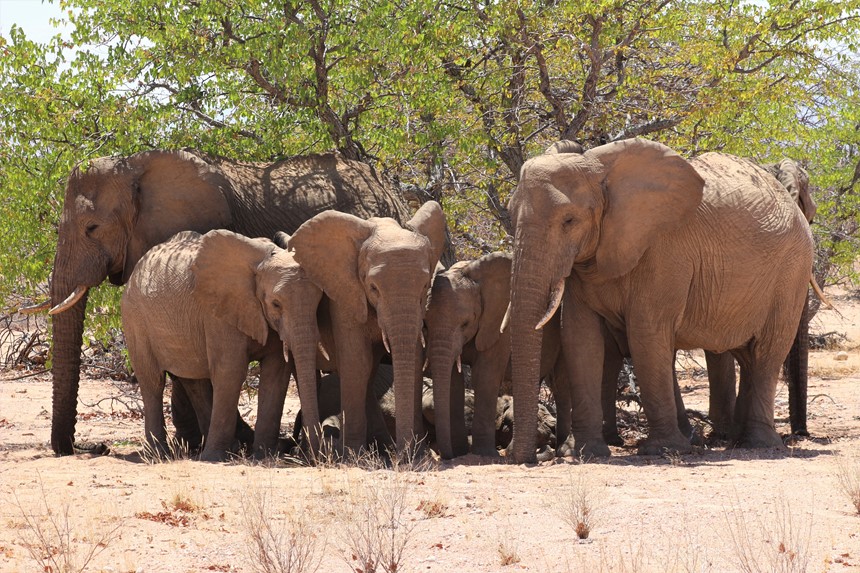
Catherine in Namibia, courtesy of Catherine Edsell
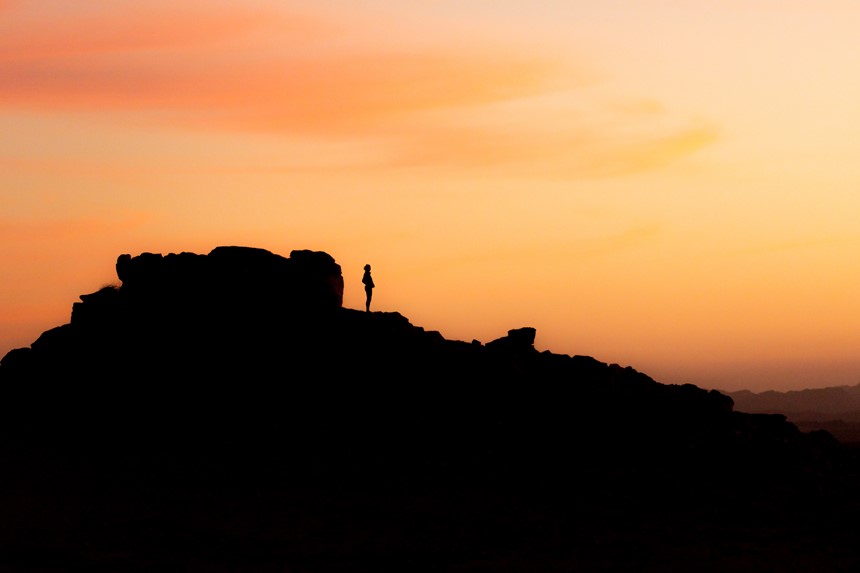
Grassroots activism
That said, I’m not the sort of activist you’ll find marching with a placard, although I have on many occasions written to MPs and policymakers, started social media campaigns and published articles. I realised early on that cooperative grassroots action is by far the most effective way to make a difference. In India in the late ‘90s, driven by the NGO sector, it was becoming obvious to aid agencies that simply giving donations of equipment or infrastructure without the full involvement of the local community resulted in water pumps left to fall into disrepair and poorly located latrines never used - money was literally being poured down the drain.
I, however, was fortunate to be involved with a number of schemes where communities were part of the decision-making process, and from the get go these projects were a resounding success. I then witnessed this being translated into animal welfare and biodiversity resource management – if the local people could be encouraged and trained to work alongside the scientists, to understand the benefits of not cutting down the rainforest and given roles in its guardianship, then the whole ecosystem, themselves included, became healthier.
When I had children, it seemed imperative for me to introduce this right thinking at an early age. I have taken my children to far-flung places to instil in them respect for other cultures, respect for the raw reality of other people’s lives and how conservation is complicated. For three summers, their best friends were Indonesian children who walked barefoot over razor-sharp coral reef flats, sucked the gonads out of sea urchins for an afternoon snack and, although they spoke little English, played games and swam with my kids, teaching them about the reefs. This adventure has changed the way they see the world.
Catherine diving (left) and her children with their Indonesian friends (right)
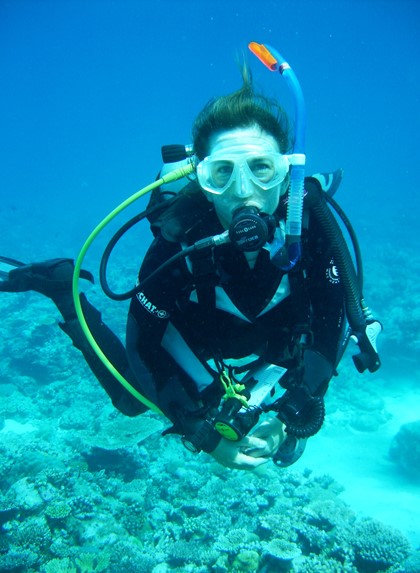
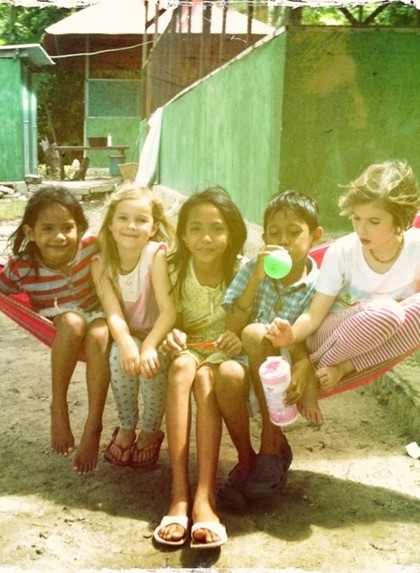
The Matriarch Adventure
My current endeavour, The Matriarch Adventure, is the distillation to date of my experiences. It is an all-women, ten-day expedition into the Namibian wilderness, during which we commune with nature and track elusive desert elephants (the most iconic matriarchs there are), exploring not only the natural history of an incredible landscape along with its crucial conservation issues, but also our connection with something bigger than ourselves. Immersion in extreme wilderness, with other women, has a powerful transformative effect, quickly stripping away the non-essential trappings of modern life in all their guises, allowing something else to fill that space.
The intention is threefold. Firstly, for women to have a deep and unforgettably visceral experience of the ‘wild’ - both in the landscapes and within themselves, pushing their boundaries and challenging themselves in ways that they may not have done before, supported by a community of women. Secondly, to witness through direct observation and first-hand information provided by Elephant Human Relations Aid (a local NGO for whom I am an ambassador) the issues currently affecting these desert-adapted elephants, and causing a rapid decline in their population. Thirdly, for women to appreciate - through a practice of stillness, reverence, humility and empathy - connection, rather than separation, from the earth.
Alongside these intentions, I invoke a question posed by Charles Eisenstein: “Is life on earth valuable or sacred in its own right, or only in utility to ourselves?" This question creates an enquiry, a shift in mindset away from the conventional scientific agenda for biodiversity, with its human-centric ‘ecosystem services’ (where the processes of natural systems are only valuable in relationship to the benefits they provide for humans), to one where the urgent call is for the protection and restoration of all ecosystems (along with all the animals that inhabit and maintain those ecosystems) to re-create a resilient biosphere.
Photos from The Matriarch Adventure, courtesy of Catherine Edsell





The Return
Upon returning from their adventures, women not only feel confident, grounded and empowered in the spheres of their own capabilities, but also passionate about conservation issues that they now have direct experience of, with a deeper understanding of the pressures the natural world is under. Is this not how activism is born?
Many of the women have since become advocates and fundraisers for EHRA, taken on stewardship roles in nature and their communities and pursued avenues in conservation that they previously wouldn’t have considered. The experience of going so far away often brings home the importance of acting within our own communities and landscapes. Separating from our daily lives allows us to determine what is really important, and gives us insight into what to do next.
David Attenborough - in his book A life on Our Planet, which accompanies the Netflix documentary of the same name - has just announced that “the future of all life on our planet depends on our willingness to take action now.” But rather than feeling overwhelmed by such an arresting appeal, first go outside, feel the sun on your face and the wind in your hair, and take a moment to ask “How can I help?” from a place of empathy. You may just hear what is calling you.


